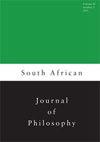星界的法律正义:在法律的诗歌与正义的舞蹈之间
IF 0.2
3区 哲学
0 PHILOSOPHY
引用次数: 0
摘要
在这篇文章中,我通过阐明法律和正义之间关系的三个新概念,以我最近的法律作为诗歌和正义作为舞蹈的概念为基础。在第一种“以诗为本的司法”中,司法是由一种死板的编舞构成的,是一种对法律诗歌的音乐朗诵。在第二种“以舞蹈为基础的法律”中,正义由自发的、自由即兴的运动模式组成,法律的诗歌试图以一种音乐符号来捕捉这些运动模式。而在第三种“法律正义”中,正义与法律是民主舞蹈大众与贵族诗歌精英之间相互决定的艺术合作。考虑到这三种类型的社区中每一种都占主导地位,然后我提出了右倾、中间派和左派社会的重新分类,分别由“文字主义”、“动力主义”和“互惠主义”社区主导,并为在每种类型中工作的立法者和活动家提供建议。总之,法律和正义,就像诗歌和舞蹈一样,变得更加灵活、包容和开放,可以进行创造性的即兴创作和合作,这是一种新的形式,我以希腊神圣正义女神阿斯特拉亚的名字命名为“星界法律正义”。本文章由计算机程序翻译,如有差异,请以英文原文为准。
Astral legal justice: Between law’s poetry and justice’s dance
AbstractIn this article, I build on my recent conceptions of law as poetry and of justice as dance by articulating three new conceptions of the relationship between law and justice. In the first, “poetry-based justice”, justice consists of a rigid choreography to a kind of musical recitation of the law’s poetry. In the second, “dancing-based law”, justice consists of spontaneous, freely improvised movement patterns that the poetry of the law tries to capture in a kind of musical notation. And in the third, “reciprocal-legal justice”, justice and law consist of a reciprocally determining artistic collaboration between the democratic dancing masses and the aristocratic poetising elites. Given that each of these predominates in one of three types of community, I then present a reclassification of right-leaning, centrist and leftist societies as dominated by “literalist”, “kinetic” and “mutualist” communities (respectively), and offer suggestions for legislators and activists working in each type. In conclusion, law and justice, qua poetry and dance, become more flexible, inclusive and open to creative improvising and collaboration, a new form that I name, after Astraea, Greek goddess of divine justice, “astral legal justice”.
求助全文
通过发布文献求助,成功后即可免费获取论文全文。
去求助
来源期刊

SOUTH AFRICAN JOURNAL OF PHILOSOPHY
PHILOSOPHY-
CiteScore
1.00
自引率
0.00%
发文量
19
期刊介绍:
The South African Journal of Philosophy (SAJP) is the official publication of the Philosophical Society of South Africa. The aim of the journal is to publish original scholarly contributions in all areas of philosophy at an international standard. Contributions are double-blind peer-reviewed and include articles, discussions of articles previously published, review articles and book reviews. The wide scope of the South African Journal of Philosophy makes it the continent''s central vehicle for the publication of general philosophical work. The journal is accredited with the South African Department of Higher Education and Training.
 求助内容:
求助内容: 应助结果提醒方式:
应助结果提醒方式:


